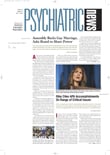Composite data presented at APA's 2005 annual meeting in Atlanta last month confirm that acamprosate (Campral) is effective in helping patients with alcohol dependence remain abstinent. Also, the drug appears to be well tolerated and has virtually no drug-to-drug interactions or adverse effects on either the liver or kidneys.
The data come from reanalyses of the three pivotal clinical trials used by Forest Laboratories to gain U.S. Food and Drug Administration (FDA) approval to market acamprosate for the maintenance of abstinence in people with alcohol dependence.
When the FDA first reviewed the data, it had questions and concerns that subsequently led to a nonapprovable decision. In light of those concerns, Forest reanalyzed the datasets and won approval for the drug in July 2004 (Psychiatric News, September 3, 2004).
Richard Rosenthal, M.D., a professor of psychiatry at Columbia University College of Physicians and Surgeons, independently analyzed the datasets. Rosenthal presented his findings at APA's annual meeting last month after releasing them at the annual meeting of the American Society of Addiction Medicine (ASAM) in April.
“These data are important because they show [acamprosate] is safe for alcohol-dependent patients and even for those who may be taking other medications,” Rosenthal told Psychiatric News. He was awarded the ASAM Scientific Program Committee Award for the highest rating for scientific merit in conjunction with the abstract he presented at that meeting.
Rosenthal's analysis of the safety data from the three clinical trials showed that discontinuation rates due to treatment-emergent adverse events for acamprosate were not statistically different from those for placebo. The most common adverse event noted with acamprosate treatment was diarrhea, which was rated as mild or moderate.
“The occurrence of diarrhea appears to be both dose related and self-limiting. It goes away after a few weeks,” Rosenthal said. In addition, the most severe diarrhea reported occurred in patients randomly assigned to placebo, not to acamprosate.
“Essentially,” Rosenthal added, “the drug is excreted unchanged through the kidneys. So there are no drug-to-drug interactions, which can be very important in patient populations such as these.”
However, because the drug is excreted through the kidneys, “in patients with moderate renal dysfunction, you might have to reduce the dosage somewhat, and in [patients with] severe kidney disease, acamprosate would be contraindicated.”
The re-analyzed efficacy data were presented by Allyson Gage, Ph.D., a senior research scientist at Forest Laboratories. Those data confirmed that the drug is associated with significantly higher percentages of patients remaining completely abstinent, compared with placebo. Three studies—one short-term study lasting 13 weeks and two long-term studies (one was 48 weeks, the other 52 weeks), showed that patients taking acamprosate were between 1.8 times and three times more likely to remain abstinent compared with patients randomly assigned to take placebo.
“What you've got here is a drug that appears to be a highly effective medication for maintenance of abstinence,” Rosenthal said. “All of these drugs, however, should be prescribed in combination with drug counseling or an evidence-based psychosocial treatment. All the data suggest that you can't simply give these patients medication and expect them to get sober.” ▪
